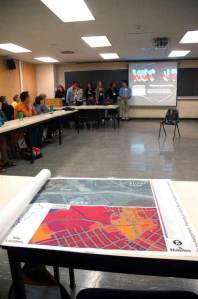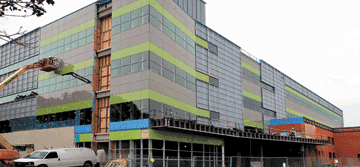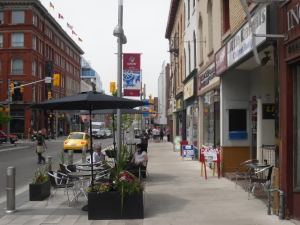This page provides an overview of all the information you need to know about the University of Waterloo’s graduate planning programs and student life. Whether you’re still deciding if Waterloo is the place for you, or are already planning on joining us, we hope this information helps guide you. Please feel free to contact any of the AGP executive with questions about the programs, student life, or Waterloo in general. We’re here to help!
For more information, check out the University of Waterloo, Faculty of Environment, and School of Planning pages. Other important contacts are:
Ms. Edie Cardwell – Graduate Studies Coordinator
Dr. Pierre Filion – Associate Director, Graduate Studies, School of Planning
Dr. Paul Parker – Associate Dean, Graduate Studies Faculty of Environment
Dr. Mark Seasons – Interim Dean, Faculty of Environment
________________________________________________________________________________________________________________________________________
Academics
Programs
The three different programs offered at the Master’s level are the Masters of Environmental Studies (Planning), Masters of Arts (Planning), and Masters of Applied Environmental Studies (Planning). The MA and MES programs are two year thesis degrees, while the MAES is a one year course-based degree for students with work experience in a planning-related field. If enrolled in the MES program, you will need to ensure that your elective courses are eligible for MES (indicated in the course description). The Doctor of Philosophy program is a four year thesis-based degree.
See Graduate Studies Calendar for more information, including requirements for each degree.
Disciplines
Within the School of Planning, several different fields are covered by faculty that can be divided into physical/natural environment and human/built environment planning. Such disciplines as biology, ecology, water/wetlands, watershed planning, forest and park planning are represented as part of the physical/natural planning focus, while urban design, social/demographic planning, economic development, regional planning, heritage planning, and health planning are some of the fields in the human/built environment focus. Check out faculty listings to read more about research interests, or professors’ publications to read some of the research completed by School of Planning faculty.
Role of your Advisor
Your thesis advisor is meant to help direct you in your thesis progress. They can help point you toward readings and thesis topics, and act as a sounding board for your ideas. They should be kept up to date on your progress and will be involved in your thesis proposal preparation and presentation at the end of 710. See the faculty listings for an advisor who is interested in your field of study or who is otherwise qualified to help you through your graduate career.
Courses
Course schedule: http://www.adm.uwaterloo.ca/infocour/CIR/SA/grad.html
Course descriptions: http://www.ucalendar.uwaterloo.ca/SA/GRAD/1011/GRDcourse-PLAN.html
PLAN 700 Planning Paradigms and Theory: This course covers the history and development of planning as a profession and the various theoriesand paradigms that have grown with it, mostly within North America but covering the development of planning in Europe as well. It provides a good background context for what planning currently is today and where it is going. Taught by Dr. Pierre Filion, Fall semester.

PLAN 701 Land Use Planning Fundamentals: This course is mandatory for those without a planning background. It covers the basics of planning practice, including how plans are developed and relevant legislation, focusing mostly on Ontario. Taught by Dr. Mark Seasons, Winter semester.
PLAN 702 Critical Assessment of Theories, Methods and Practices of Planning (MAES only): Coming soon
PLAN 703 Planning Professional Practice: A different perspective on planning is taken in this class, covering issues planners face in the real world and focusing on developing communications skills that are a must for any planner. Taught by Ray Simpson of Hemson Consulting Ltd., Fall semester.
PLAN 710 Research Design: This course covers the process of preparing a thesis proposal (a milestone for MES and MA degrees). It takes you through the steps using small reading and writing assignments each week. By the end, you’ll have a draft literature review, a completed proposal, and a good start on your thesis path. Think about your thesis topic before starting this class but expect it to develop and change as you go on. Taught by Dr. Dawn Parker, Winter semester.
Milestones
There are three milestones that need to be completed for the MA and MES programs. The first is the Teamwork Strategies Workshop that occurs during Orientation Week in your first semester. The second and third are a written and oral presentation of your thesis proposal, completed as part of PLAN 710 in the winter semester of your first year.
Thesis
The MA , MES, and PhD programs require the completion and successful defence of a thesis. Requirements can be found on the Graduate Studies website.
Timeline
MA, MES and PHD students take PLAN 710 in their second term. Students create and present their thesis proposal which is also a milestone for degree completion. This means that most students have a clear picture of their thesis topic by the end of the first eight months of the degree. This gives MES and MA students up to four more 4-month terms to complete their thesis.
Thesis Committee
Your thesis committee consists of three members. One is your advisor, one is a ‘reader’, and the third acts as a secondary advisor. They are available to help you with your thesis progress and should be kept up to date on your progress. They are also involved in your thesis defence and final thesis write-up.
__________________________________________________________________
Campus
EV Buildings
The Faculty of Environment is located in EV1 and EV2 on the west side of campus. The School of Planning is currently located in EV1 but will be moving to the new EV3 building once it is completed (this move is scheduled to be completed by September 2011). EV3 is aiming for LEED platinum certification and will include a two-storey bio wall, a constructed wetland, green roof, and café. See the Faculty of Environment webpage for more details on the new Environment building.
Study space
There are currently two study rooms located in EV1 (EV1 355 is a group study room and EV1 357 is a quiet study room). Both rooms require an access code to enter and are designated spaces for Environment grad students. There are also lockers, a printer, and a phone located in the group study room. There is also a student lounge on the third floor of EV1 containing couches, a microwave and fridge.
Grad House

The Grad House is a gathering place exclusive to graduate students at the University of Waterloo. It offers a variety of food and beverages(including inexpensive daily specials), live music, and a relaxed space for students to interact. See Grad House on the GSA website for more information.
Student Life Centre
The SLC provides a variety of services and food outlets, open 24 hours a day. Some outlets include Subway, the Bombshelter Pub, Pizza Pizza, and Teriyaki Experience. The WatCard office and Housing offices are also located in the SLC. Check out the SLC website for more details.
Safety
There are several safety resources available for students on campus. RIDESAFE is a free service that will drive you to within a certain radius of campus along east and west routes that leaves from the Student Life Centre (SLC). WALKSAFE is a program that provides students with a team of two student security members (one male, one female) who will accompany you around campus at night. Both services are provided by UW Police Services. All pay phones on campus also have a red emergency button to contact UW Police and a green button to contact WALKSAFE. Check out UW Police Services for additional safety information.
Campus Plaza
Located to the east of campus, the Plaza contains dozens of restaurants and shops. See UWPlaza for a list of businesses.
Libraries
 There are two primary libraries on the UW main campus, Dana Porter (arts, humanities, and social sciences) and Davis Centre Library (engineering, mathematics, sciences). Other libraries include the Map Library (currently located in EV1) and Musagetes Architecture Library (in the School of Architecture in Cambridge). The library webpage contains the library catalogue (called Primo) and links to many research resources. Using the bar code number on your WatCard you can login to the library website from off campus to access all these resources, including online journal article and statistics databases. The University of Waterloo has partnered with Laurier and Guelph Universities so you also have access to their library catalogues. You can request items from these catalogues to be picked up at UW libraries or photocopies of journal articles through the RACER system which will be delivered to your mailbox in EV1 355. There are several library workshops that are offered to help you learn the UW system. Check out the UW Library webpage for more info.
There are two primary libraries on the UW main campus, Dana Porter (arts, humanities, and social sciences) and Davis Centre Library (engineering, mathematics, sciences). Other libraries include the Map Library (currently located in EV1) and Musagetes Architecture Library (in the School of Architecture in Cambridge). The library webpage contains the library catalogue (called Primo) and links to many research resources. Using the bar code number on your WatCard you can login to the library website from off campus to access all these resources, including online journal article and statistics databases. The University of Waterloo has partnered with Laurier and Guelph Universities so you also have access to their library catalogues. You can request items from these catalogues to be picked up at UW libraries or photocopies of journal articles through the RACER system which will be delivered to your mailbox in EV1 355. There are several library workshops that are offered to help you learn the UW system. Check out the UW Library webpage for more info.
Huntsville Waterloo Summit Centre for the Environment
This is a new building located in Huntsville that is meant to house short courses, meetings, conferences, workshops, field exercises, and an ecology lab, along with accommodation for 40-50 people. See more on the Summit Centre webpage.
____________________________________________________________________________________________________________________________________
Resources
WatCard
This is your student identification card at UW. It is needed to access library resources and the regional transit system (GRT), and can be used to make purchases on campus using flex dollars (though it cannot be used at the Grad House). When you first arrive at UW getting your WatCard should be one of your first steps. You can either e-mail a photo or have one taken at the WatCard office in the SLC. You will need government issued photo identification to pick up your WatCard. See WatCard for more information.
UW E-mail
Once you accept an offer of admission, you will receive a @uwaterloo.ca nexus e-mail account. This is accessed using your WatIAM user id and password. Login here.
Quest
This site acts as your UW account, where you can find financial information (such as fees owing) and where you register for classes. It is accessed using your WatIAM user id and password. Login here.
UW ACE
ACE is the main online interface for your courses. It is where professors post lecture and assignment materials and through which you will receive course e-mails. It is accessed using your WatIAM user id and password. Login here.
________________________________________________________________________________________________________
Living in Kitchener-Waterloo
Around Town
Kitchener-Waterloo offers several amenities accessible to students. Uptown Waterloo and Downtown Kitchener are central hubs for shops, restaurants and activities. Conestoga Mall in northern Waterloo and Fairview Park Mall in Kitchener are both readily accessible by bus or car. There are also two large farmer’s markets nearby, located in St. Jacob’s, north of Waterloo, and in Downtown Kitchener.
Social Life
There’s a lot going on here! In Uptown Waterloo, the new public square has year-round programming that includes a farmer’s market, yoga classes, concerts, movies, roller derby and bike polo. Check out The Jane Bond and Starlight for a full calendar of concerts and DJs, as well as Stitch ‘n’ Kitsch which is a craft fair held twice a year featuring local artists. If you’re looking for a lecture-type event, TEDxWaterloo and Ignite Waterloo are innovative events where you can meet people from the KW community that are making a difference.
Housing
Graduate students have several housing options. On the main campus, St. Paul’s University College offers apartments and suites for grad students, while Columbia Lake Village North provides townhouses for singles and families with a more residential community feeling. There are also several off-campus housing options. The university offers listings of off-campus housing, while more options can be found on such sites as Kijiji, Craigslist, and ApartmentInfo. Because several students at Waterloo are co-op students, lease terms can start in May, September or January.
Travelling
Grand River Transit: The GRT is the transit system serving the Region of Waterloo. It provides bus service to the Region with hubs in Uptown Waterloo, Downtown Kitchener and Downtown Cambridge. Your WatCard will act as a bus pass for any GRT route. Each GRT stop sign has a designated 4-digit identifier which can be either texted to or called into the GRT (57555 or 888-585-7555) to receive the next scheduled bus times for that stop. The GRT also has a trip planner on their website, and their bus times and routes are programmed into Google Maps (as part of the Directions function). For more details, see Grand River Transit.
Greyhound: Greyhound buses serve the University of Waterloo directly, stopping at the Student Life Centre. Greyhound also serves the Charles St. Transit Terminal located in downtown Kitchener. See Greyhound for more information.
GO: GO buses also leave directly from the University of Waterloo at the Davis Centre bus stop on Ring Road. GO trains will also soon be serving the VIA train station in Kitchener. More information can be found at GO Transit.
VIA Rail: VIA Rail has a train station located in downtown Kitchener. Youth (ages 12-25) receive a discount on train fare. Check out VIA Rail to see more.
________________________________________________________________________________________________________
Organizations
Graduate Student Association (GSA)
All graduate students at the University of Waterloo are represented by the Graduate Student Association, which represents graduate student interests to the University administration and government, provides student services, and organizes student events. The executive of the GSA are elected directly by graduate students. The GSA also runs Grad House and administers fees (including health and dental insurance) to students on tuition statements (viewable on Quest). More information can be found on the GSA website.
Graduate Student Endowment Fund (GSEF)
The Graduate Student Endowment Fund is administered by the GSA with an independent board of directors. It provides funding to projects proposed by graduate students that enhance the graduate student experience through an application and review process. The money is gathered through refundable contributions from students charged to tuition statements each term. GSEF also runs the Graduate Student Research Conference each year, where students can present their research to peers. See GSEF or for more details.
Waterloo Environment Student Endowment Fund (WESEF)
WESEF fulfills a similar role as GSEF, though the committee is comprised of elected environment graduate students. Again, the focus is on funding student projects that improve the experience of Faculty of Environment students. Currently, WESEF is holding a “$100,000 in Change” competition for larger student-run projects. See WESEF for more details.
Ontario Professional Planners Institute (OPPI)
The OPPI is a not-for-profit organization that represents practicing planners in Ontario. The planning program at the University of Waterloo is accredited by the OPPI, so that as a student here you can register as a student member of OPPI and gain many of the benefits of practicing planners. More information can be found at OPPI.
Canadian Institute of Planners (CIP)
The CIP is the national equivalent of the OPPI; being a member of the OPPI also makes you a member of CIP. Check out the CIP website for more information.
Canadian Association of Planning Students/L’Association Canadienne des Étudiants en Aménagement et en Urbanisme (CAPS-ACÉAU)
CAPS represents planning students all across Canada. It is completely student run and holds an annual conference to showcase student research. In 2011, the CAPS conference was held at the University of Waterloo. See the CAPS-ACÉAU website for more details.
____________________________________________________________________________________________________________________________________
Funding
Scholarships/Financial Aid
There are several funding opportunities for graduate students at the University of Waterloo. Two of the largest are the Ontario Graduate Scholarship Program and Tri-Council Scholarships (Natural Sciences and Engineering Research Council of Canada, Social Sciences and Humanities Research Council, and Canadian Institutes of Health Research). Many other more specific funding and scholarships are available and can be viewed on the Grad Studies Scholarships and Financial Aid webpage. For students requiring financial aid, the Ontario Student Assistance Program is also available (more information can be found here). You should begin looking for funding as soon as possible.
Teaching/Research Assistantship
Graduate students in the MA, MES, and PhD programs are offered paid teaching or research assistantship positions from the School of Planning (details in your acceptance package). TA positions may be offered for courses outside the School of Planning, while RA positions are based on the needs and resources of your advisor. More information can be found on the GSA and Graduate Studies (School of Planning) websites.
Campus Events
Throughout the year, several events are put on that benefit students. Some examples from the past year include speaker series and Toronto Raptors games. The AGP has also held several events, such as weekly trivia games, a walking tour of Toronto with Paul Bedford, an Ugly Christmas Sweater party and bowling night, and the annual AGP/EGSA Charity Ball at Caesar Martini’s which raised money for the Food Bank of Waterloo Region.




